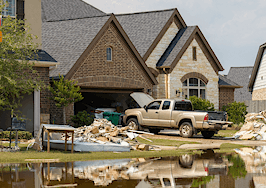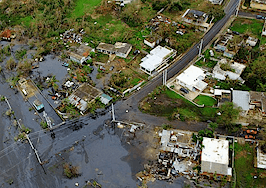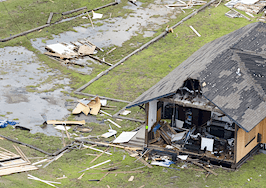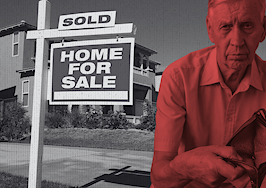This year’s brutal Atlantic hurricane season is being recorded as one of the top 10 most active of all time. In documenting the aftermath, a new report from mortgage lender Freddie Mac assesses the total damage and details how the storms will put pressure on critical housing needs in both the short and long term.
Starting in late August, over the course of just a few months Hurricanes Harvey, Irma and Maria had little mercy as they battered parts of Texas, Florida, Puerto Rico and the U.S. Virgin Islands.
According to Moody’s Analytics, the early forecast predicts the total economic loss from Hurricanes Harvey and Irma (in Texas and Florida, respectively) will be approximately $168 billion, with roughly $51-56 billion worth of residential real estate affected by Harvey and $30-40 billion affected by Irma.
In Puerto Rico, which got hit by both Irma and Maria, the numbers are less clear due the island’s logistical challenges and ongoing recovery, but damage estimates fall somewhere between $45-95 billion, and residential real estate, which is expected to be among the biggest drivers of economic loss, could be between $25-55 billion.
On a national scale, housing inventory has been a topic of much concern for the real estate industry. The lack of a balanced real estate market, where new home construction doesn’t meet the demand for homeownership, coupled with further destruction of existing homes at the hands of a natural disaster in this case, leads to myriad issues.
The report finds that approximately 15,500 homes were destroyed in Houston alone, and over 270,000 homes throughout the hurricane-affected areas have been damaged or destroyed. In the Florida Keys, it’s estimated that 25 percent of homes were destroyed and around 90 percent were damaged.
“We have a shrinking in the stock, which in turn, is likely to lead to compression in inventory numbers,” explained George Ratiu, the National Association of Realtors (NAR) managing director of housing and commercial research. “So as we’ve seen over the last two years, when there’s not enough inventory but there’s still demand for housing, basically the equilibrium price is going to move up.”
Harvey’s impact on inventory, for example, was similar to that of Hurricane Katrina in 2005. According to the report, “the annualized quarterly home price appreciation rate in New Orleans jumped from about 11 percent in the second quarter of 2005 to about 18 percent in the fourth quarter.”
“In short, I think that these events are likely to exacerbate the issues right now we’re having with shortage of inventory and rising prices which are directly impacting buyers, particularly first-time buyers,” Ratiu explained.
Since the storms, Ratiu noted we’ve seen double digit drops in home sales for both Texas and Florida. Houston’s housing market was on a record-setting pace just before the storm.
Ratiu estimates it will take at least 18 months to rebalance the market in Texas and Florida. In Puerto Rico, it’s still far too early to tell how long the housing market will take to rebalance as government agencies sort out how much aid to give and how to handle the island’s debt crisis.
One of the reasons that inventory will take so long to rebound is because of a general labor shortage. In Texas, according survey from the Associated General Contractors of America, 69 percent of the contractors were having trouble filling positions before the storm, due in part to a crackdown on the undocumented workers that make up an estimated 28 percent of Texas’s construction workforce.
In the metro Houston area, it’s estimated that 20,000 construction workers will be needed to handle the volume of repair and construction work, the report says.
“We’ve been having a shortage of construction workers since the recession, a lot of them never came back to the industry,” Ratiu said. “And now a lot of these workers are going to have to address infrastructure rebuilding, which does not leave a whole lot of room for building new homes.”
Delinquencies are expected to rise in the short-term as well, according to the report. It’s estimated, according to Black Knight Financial Services, delinquencies could rise 16 percent in Houston, based on post-Katrina data. Government-sponsored enterprises will hopefully be able to alleviate some of the stresses put on homeowners, by suspending foreclosures and evictions.













